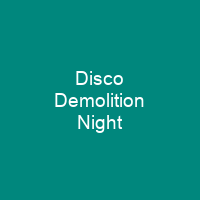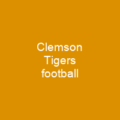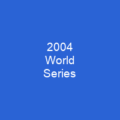Disco Demolition Night was a Major League Baseball promotion on Thursday, July 12, 1979, at Comiskey Park in Chicago, Illinois. At the climax of the event, a crate filled with disco records was blown up on the field between games of the twi-night doubleheader between the Chicago White Sox and the Detroit Tigers. The playing field was so damaged by the explosion and by the fans that the White Sox were required to forfeit the second game to the Tigers. Some scholars and disco artists have debated whether the event was expressive of racism and homophobia.
About Disco Demolition Night in brief
 Disco Demolition Night was a Major League Baseball promotion on Thursday, July 12, 1979, at Comiskey Park in Chicago, Illinois. At the climax of the event, a crate filled with disco records was blown up on the field between games of the twi-night doubleheader between the Chicago White Sox and the Detroit Tigers. Many of those in attendance had come to see the explosion rather than the games and rushed onto the field after the detonation. The playing field was so damaged by the explosion and by the fans that the White Sox were required to forfeit the second game to the Tigers. The event preceded, and may have helped precipitate, the decline of disco in late 1979. Some scholars and disco artists have debated whether the event was expressive of racism and homophobia. Disco evolved in the late 1960s in inner-city New York nightclubs, where disc jockeys played imported dance music. Although its roots were in African-American and Latin American music, it eventually became mainstream; even white artists better known for more sedate music had disco-influenced hits, such as Barry Manilow’s \”Copacabana\”. The release of the hit movie Saturday Night Fever in 1977, whose star and musical performers presented a heterosexual image, helped popularize disco in the USA. In 1978, New York’s WKTU-FM, a low-rated rock station, switched to disco and became the most popular station in the country; this led other stations to try to emulate its success.
Disco Demolition Night was a Major League Baseball promotion on Thursday, July 12, 1979, at Comiskey Park in Chicago, Illinois. At the climax of the event, a crate filled with disco records was blown up on the field between games of the twi-night doubleheader between the Chicago White Sox and the Detroit Tigers. Many of those in attendance had come to see the explosion rather than the games and rushed onto the field after the detonation. The playing field was so damaged by the explosion and by the fans that the White Sox were required to forfeit the second game to the Tigers. The event preceded, and may have helped precipitate, the decline of disco in late 1979. Some scholars and disco artists have debated whether the event was expressive of racism and homophobia. Disco evolved in the late 1960s in inner-city New York nightclubs, where disc jockeys played imported dance music. Although its roots were in African-American and Latin American music, it eventually became mainstream; even white artists better known for more sedate music had disco-influenced hits, such as Barry Manilow’s \”Copacabana\”. The release of the hit movie Saturday Night Fever in 1977, whose star and musical performers presented a heterosexual image, helped popularize disco in the USA. In 1978, New York’s WKTU-FM, a low-rated rock station, switched to disco and became the most popular station in the country; this led other stations to try to emulate its success.
The media emphasized its roots in gay culture. According to historian Gillian Frank, by the time of the Disco Demolition, the media … cultivated a widespread perception that disco was taking over. In the weeks leading up to Disco Dem demolition Night, several thousand anti-disco public events were held, many of which became unruly. When the police switched from a discotheque in Lynwood, Illinois, to a rock concert in June 1979, the police arrived as several thousand disco fans arrived, and several thousand, as well as several hundred police officers. The police were called in to control the unruly public events, which became known as the ‘Cohos’, or ‘Disco Sucks’ The event remains well known as one of the most extreme promotions in MLB history. The White Sox officials had hoped for a crowd of 20,000, about 5,000 more than usual. Instead, at least 50,000—including tens of thousands of Dahl’s adherents—packed the stadium, and thousands more continued to sneak in after gates were closed. After Dahl blew up the collected records, thousands of fans stormed the field and remained there until dispersed by riot police. The second game was initially postponed, but was forfeited by the American League president Lee MacPhail the next day by order of American League President Lee Mac Phail. In. 1978, a mock organization, the ‘Insane Lips Lips Coho army’, was formed consisting of Dahl and his listeners.
You want to know more about Disco Demolition Night?
This page is based on the article Disco Demolition Night published in Wikipedia (as of Dec. 03, 2020) and was automatically summarized using artificial intelligence.







